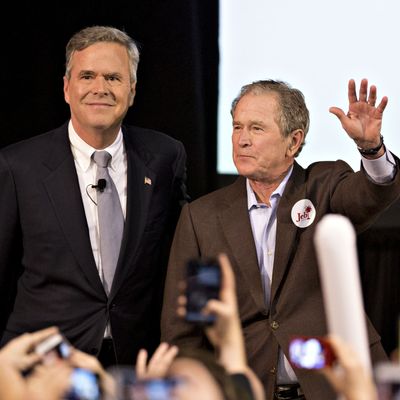
Last fall, Donald Trump claimed that, on September 11, 2001, thousands of Muslims cheered the fall of the World Trade Center. This vicious fiction drew the scorn of fact-checkers and social liberals but caused nary a ripple in the Republican field. But, on Saturday night, Trump said something else about 9/11, something so far beyond the pale that conservatives finally rose up in righteous indignation. He claimed that on 9/11 the president of the United States was George W. Bush.
Republicans disagree internally on aspects of Bush’s domestic legacy, but his record on counterterrorism remains a point of unified party doctrine. Bush, they agree, Kept Us Safe. To praise the president who oversaw the worst domestic terrorist attack in American history for preventing domestic terrorism is deeply weird, and the only way this makes any sense is to treat 9/11 as a kind of starting point, for which his predecessor is to blame. (Marco Rubio, rushing to Dubya’s defense at Saturday night’s Republican debate, explained, “The World Trade Center came down because Bill Clinton didn’t kill Osama bin Laden when he had the chance to kill him.”) Trump not only pointed out that Bush was president on 9/11 and that the attacks that day count toward his final grade, but he also noted that Bush failed to heed intelligence warnings about the pending attack and that his administration lied to the public about weapons of mass destruction in Iraq.
Conservatives have always dismissed such notions as far-left conspiracy theorizing, often equating it with the crackpot notion that 9/11 was an inside job. The ensuing freak-out at Trump’s heresy has been comprehensive. “It turns out the front-runner for the GOP nomination is a 9/11 ‘truther’ who believes Bush knew 9/11 was going to happen but did nothing to stop it,” says Marc Thiessen, the columnist and former Bush administration speechwriter. “Moreover, Trump says, Bush knew there were no weapons of mass destruction in Iraq but lied to the American people to get us into a Middle East war.” Trump is “borrowing language from MoveOn.org and Daily Kos to advance the absurd ‘Bush lied, people died’ Iraq War narrative,” cried National Review’s David French. Weekly Standard editor Bill Kristol demanded that, even should Trump win the nomination, fellow Republicans refuse to “conscientiously support a man who is willing to say something so irresponsible about something so serious, for the presidency of the United States.”
In fact, Trump has not claimed that Bush had specific knowledge of the 9/11 attacks. He said, “George Bush had the chance, also, and he didn’t listen to the advice of his CIA.” That is correct. Bush was given numerous, detailed warnings that Al Qaeda planned an attack. But the Bush administration had, from the beginning, dismissed fears about terrorism as a Clinton preoccupation. Its neoconservative ideology drove the administration to fixate on state-supported dangers — which is why it turned its attention so quickly to Iraq. The Bush administration ignored pleas by the outgoing Clinton administration to focus on Al Qaeda in 2000, and ignored warnings by the CIA to prepare for an upcoming domestic attack. The Bush administration did not want the 9/11 attacks to occur; it was simply too ideological and incompetent to take responsible steps to prevent them.
It is certainly true that Trump took his attack a step too far when he insisted the Bush administration “knew” there were no weapons of mass destruction in Iraq. All of the evidence suggests that the Bush administration, along with intelligence agencies in other countries, believed Saddam Hussein was concealing prohibited weapons. But the evidence is also very clear that the Bush administration manipulated the evidence it had to bolster its case publicly, like police officers framing a suspect they believed to be guilty.
The cover-up was grotesquely crude. Republicans in Congress insisted that the original commission investigating the issue confine itself to faulty intelligence given to the Bush administration and steer clear of manipulation by the Bush administration itself. The report stated this clearly: “Our executive order did not direct us to deal with the use of intelligence by policymakers, and all of us were agreed that that was not part of our inquiry.” It was not until a subsequent commission that the administration’s culpability was investigated. And that commission, which became known as the “Phase II” report, found that the Bush administration did indeed mislead the public: “[T]he Administration repeatedly presented intelligence as fact when in reality it was unsubstantiated, contradicted, or even non-existent.”
You might think Republicans would have developed a sophisticated response, but they haven’t. Their defense for the last decade has consisted of claiming the Phase I report, which was forbidden from investigating the Bush administration, actually vindicated Bush, and ignoring the existence of the Phase II report. Today’s Wall Street Journal editorial does it again, calling the claim that Bush lied a “conspiracy theory,” which was refuted by — you guessed it — the Phase I report. (“Their report of more than 600 pages concludes that it was the CIA’s ‘own independent judgments — flawed though they were — that led them to conclude Iraq had active WMD programs.’”)
Republicans have walled inconvenient facts about the Bush administration’s security record out of their minds by associating them with crazed conspiracy theorists. It is epistemic closure at work: Criticism of Bush on 9/11 and Iraq intelligence is dismissed because the only people who say it are sources outside the conservative movement, who by definition cannot be trusted. The possibility that the Republican Party itself would nominate a man who endorses these criticisms is horrifying to them. To lose control of the party in such a fashion would be a fate far worse than losing the presidency.






























